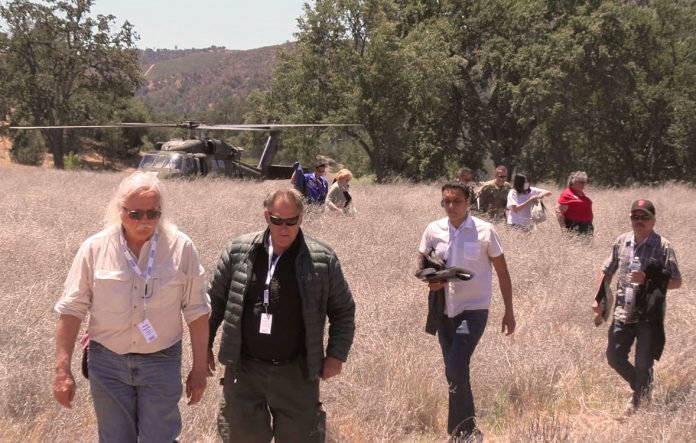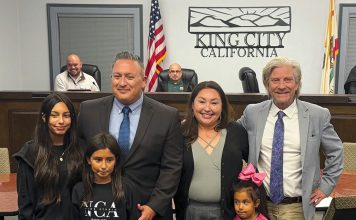
JOLON — Twenty employers from the San Francisco area participating in Boss Lift got a rare opportunity to fly from the Bay Area’s Moffett Field to Fort Hunter Liggett (FHL) in military aircrafts and observe Army training up close and personal.
The June 12 event was hosted by the California Employer Support of the Guard and Reserve (ESGR) and FHL, and enhanced employers’ knowledge of the Army Reserve and National Guard missions.
Ivan Ho, a district manager with Kaiser Permanente, said he knew “pretty much nothing” about the military before Boss Lift.
“This gave me a good idea of what the Army is about. Now I know that the United States puts in a lot of time and energy to make sure these Soldiers are trained,” Ho said.
His employee is Staff Sgt. Duane Ramos with the 129th Rescue Wing based at Moffett Field.
Their day started with a breakfast, welcoming remarks by Army Reserve and National Guard leaders, an ESGR brief and presentation of Patriot Awards for the employers. The fun part was flying to Paso Robles in a C-130 Hercules courtesy of California Air National Guard 129th Rescue Wing.
From Paso Robles, they boarded two UH-60 Black Hawk helicopters courtesy of the California Army National Guard 1/140th Aviation Regiment.

“Boss Lift is a way for us to give back to the community,” said U.S. Army Garrison Fort Hunter Liggett Commander, Col. Charles Bell. “We timed this event at our peak training surge to showcase the two major exercises going on simultaneously at Fort Hunter Liggett. Our intent was to show employers what their Citizen Soldier does when they take military leave from their civilian job to conduct their two-week annual training.”
Bell, the 63rd Readiness Division Commanding General Maj. Gen. Alberto Rosende and the 91st Training Division Commanding General Brig. Gen. Patricia Wallace provided opening remarks and answered questions.
Then employers received a MRE (Meals-Ready-to-Eat) as their lunch. There were many soldiers on hand to provide instructions on how to unpack the MRE, heat and eat the food.
Employers were then flown in the Black Hawks to observe infantry operations during the California National Guard’s eXportable Combat Training Capability Exercise (XCTC) led by the 79th Infantry Brigade Combat Team. The XCTC program is brigade field training exercise designed to certify platoon proficiency in coordination with the First Army.
From there, they were flown to Schoonover Airfield and received a tour of a Combat Support Hospital, part of the Army Reserve Combat Support Training Exercise (CSTX). Army Reserve Soldiers in the medical field often have the same professions in their civilian jobs, and bring a wealth of experience to the battle.

“This was an emotional experience for me because I used to come out here 20, 30 years ago as a young soldier,” said Sensheer Ortiz, a Drug Enforcement Agency supervisory analyst.
Ortiz really enjoyed the helicopter ride and was appreciative of the experience. Her employee is Master Sgt. John Groboske with the 129th Air Wing Counterdrug Task Force Detachment.
The success of Boss Lift was due to many organizations working together for more than a year to give employers this rare experience. A concurrent event was held at Los Alamitos Joint Forces Training Base with 26 employers getting a tour of many facilities and receiving the ESGR Patriot Award.
Additional employers were at the presentation portion of Moffett Field but were not able to fly to FHL with the rest of the group.
“We worked through Covid constraints, conflicting missions, time and funding issues, you name it,” said Phil Stage, vice-chair of the California ESGR program. “But, bottom line is that all the Reserve Component services came together to support 59 employers between NorCal – Moffett, Fort Hunter Liggett and Los Alamitos Joint Forces Training Base.”
“It went really well,” said the 91st Training Division Commanding General Brig. Gen. Patricia Wallace.
She enjoyed the conversations with the employers and emphasized how the Reserve Soldier comes with valuable training, degrees and certifications.
“Many of the employers are small employers, and they can’t afford to have one or two employees gone for a long time. So we really need to be cognizant of their hardships and support them any way we can,” Wallace said.
Article submitted by Amy Phillips, Fort Hunter Liggett Public Affairs Office.














